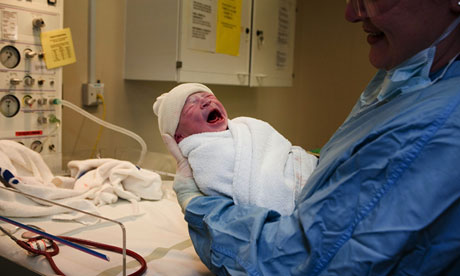
The NHS has been pressed to urgently overhaul maternity care after it emerged that it paid out £3.1bn in damages over a decade to babies and mothers injured as a result of staff errors during childbirth.
Maternity doctors have described a new report from the NHS Litigation Authority, detailing the mistakes that occurred in 5,087 births in England between 2000 and 2010, as "staggering" and "a serious wake-up call".
The study by the NHSLA, which handles legal actions for medical negligence against hospitals, found that "in the 5,087 cases that resulted in claims, junior doctors and inexperienced midwives were often involved in the management of labour in these cases without adequate assistance from senior clinicians". The total £3.1bn bill also includes the cost of legal fees.
It recommends that more senior maternity doctors need to be on duty more of the time in order to reduce the number of blunders, which can result in grave injury for the mother and brain damage to the baby. It often costs the NHS £6m or more to settle an action involving a brain-damaged baby, because their lifetime care needs as a result of their disability are so expensive.
"The NHSLA report is staggering in its stark facts and the reality of the enormous costs of maternity litigation. Hidden behind the financial burden are countless stories of tragedy to individuals and families," said David Richmond, the vice-president for clinical quality at the Royal College of Obstetricians and Gynaecologists (RCOG).
"This is a serious wake-up call to all with responsibilities in providing maternity care, whether as providers, commissioners or regulators. Urgent action is needed to further improve the safety of clinical services for women and their babies."
Blunders in three areas of maternity care featured in 70% of the 5,087 actions studied. These involved mistakes in interpreting the results of a cardiotocograph trace, which listens to the unborn baby's heartbeat; errors during the management of the mother's labour; and cases resulting in cerebral palsy. A total of 542 claims for cerebral palsy cost the NHS some £1.3bn alone, the report revealed.
Catherine Dixon, the NHSLA's chief executive, sought to reassure parents-to-be. "Having a baby while under the care of NHS doctors and midwives remains very safe. Out of 5.5m births in England during the decade covered by the report, about one in a thousand resulted in a legal claim against the NHS," she said.
But the seriousness of mistakes in maternity care meant it was "vital" that NHS staff learned lessons from the report and did what they could to provide improved care.
The RCOG backed the NHSLA's call for more experienced doctors to be available more of the time in maternity units but said the number of midwives needed to rise too. "The cost of fully staffing the units in England and Wales would be around half the cost of litigation and would contribute to reducing the claims considerably," said Richmond.
Cathy Warwick, the chief executive of the Royal College of Midwives, said: "It is tragic that the same problems reoccur in our maternity services year on year." She backed the NHSLA's call for maternity staff to receive more training but warned that staff shortages or overwork meant that care for women in labour was not always ideal. "High-quality assessment of women, good communication, team working and one-to-one care in labour are key components of safe care. Inevitably all of these suffer if staff are overstretched," she said.
The health minister Dr Dan Poulter, who is also an NHS obstetrician, said the NHS needed to learn lessons from the report. "The NHS remains one of the safest places in the world to have a baby, but no matter how well our midwives and doctors look after women giving birth, bad things still sometimes happen to a very small number of mothers and babies," he said.
"On rare occasions care falls below acceptable standards and unsafe care should never be tolerated. As a doctor who has worked in maternity care, I am acutely aware of the pain and stress that can be caused to parents and babies in these situations. If these incidents hadn't happened in the first place, the NHS would have had £3bn more to spend on patient care over the past 10 years."

